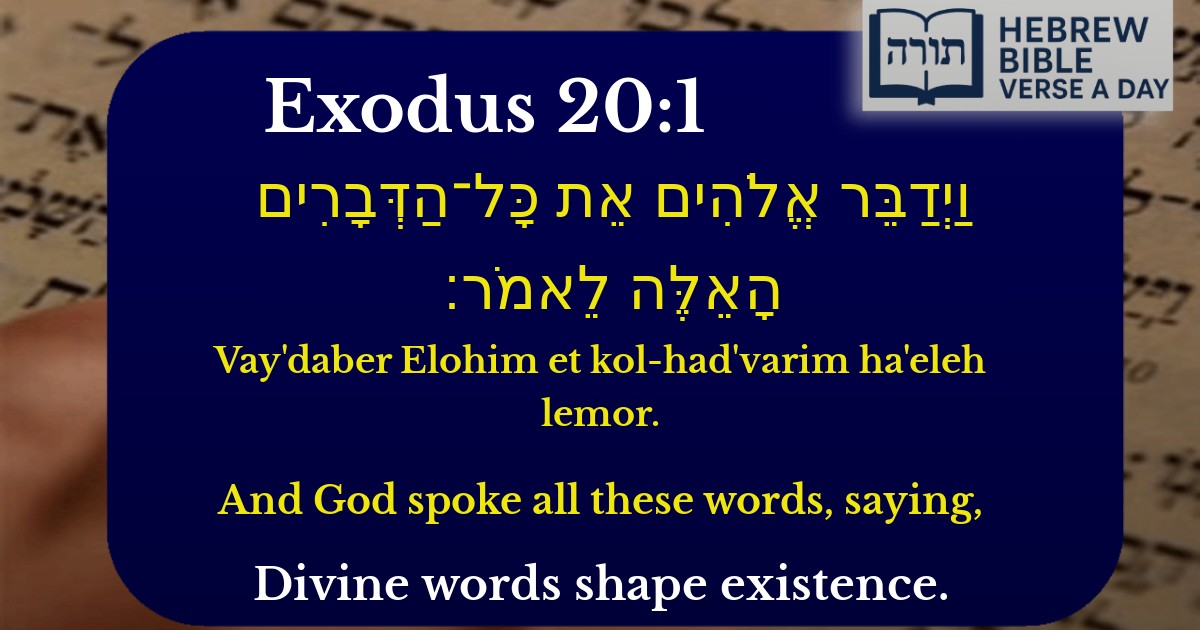Frequently Asked Questions
Q: What does 'And God spoke all these words' mean in Exodus 20:1?
A: This verse introduces the Ten Commandments, emphasizing that all the commandments were spoken directly by God to the Jewish people at Mount Sinai. According to Rashi, this highlights the divine origin and authority of the Torah's laws.
Q: Why is Exodus 20:1 important in Judaism?
A: Exodus 20:1 is foundational because it marks the moment when God revealed the Ten Commandments, forming the basis of the covenant between God and the Jewish people. The Rambam teaches that this event established the Torah as the guide for Jewish life and morality.
Q: What can we learn from Exodus 20:1 today?
A: We learn that Torah is not just a human document but divine instruction. The Talmud (Makkot 24a) explains that all 613 mitzvot are rooted in these Ten Commandments, showing their enduring relevance for Jewish practice and belief.
Q: How does Exodus 20:1 apply to daily Jewish life?
A: This verse reminds us that our observance of mitzvot connects us to the revelation at Sinai. The Midrash (Shemot Rabbah 28:6) teaches that every Jew, in every generation, should feel as if they personally stood at Sinai receiving these words from God.
Q: Why does the verse say 'all these words' instead of listing the commandments?
A: According to Rashi, 'all these words' emphasizes that God spoke the entire Torah at Sinai - not just the Ten Commandments. The Talmud (Berachot 5a) explains that this includes both the written Torah and the oral traditions later recorded in the Mishnah and Talmud.


The Significance of "All These Words"
Rashi (Exodus 20:1) explains that the phrase "all these words" indicates that Hashem spoke the Ten Commandments in a single utterance—something humanly impossible. This underscores the divine origin of the Torah and the unity of all mitzvot, as they were given simultaneously before being broken down for human comprehension.
The Power of Divine Speech
The Rambam (Moreh Nevuchim 2:33) teaches that when the Torah states "And God spoke," it emphasizes the unique prophetic revelation at Har Sinai, where Bnei Yisrael experienced direct communication from Hashem without intermediary. This distinguishes Matan Torah from all other prophecies.
The Inclusion of "Saying" (לֵאמֹר)
The Midrash (Mechilta, Yitro 9) notes that the word "לֵאמֹר" implies Moshe was commanded to repeat these words to Bnei Yisrael precisely. This establishes the mesorah (transmission) of Torah—each generation must teach the next without alteration (Devarim 4:2).
Kabbalistic Insight
The Zohar (Yitro 85a) teaches that "all these words" refers not only to the Ten Commandments but to the entirety of Torah—both Written and Oral—which was latent in this moment of revelation. This aligns with the Talmudic principle (Berachos 5a) that "all is in the hands of Heaven except the fear of Heaven," as the words were given, but their application requires human effort.
Halachic Implications